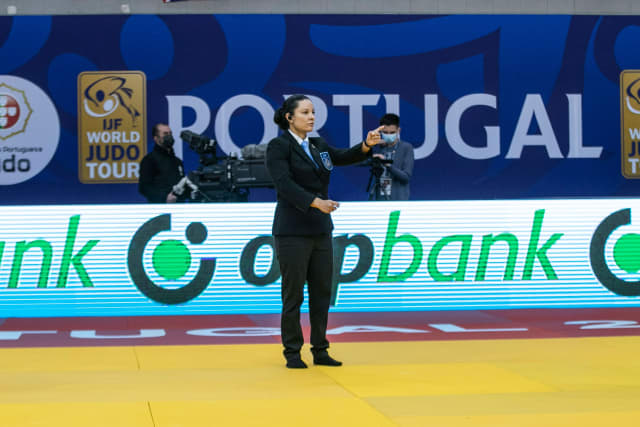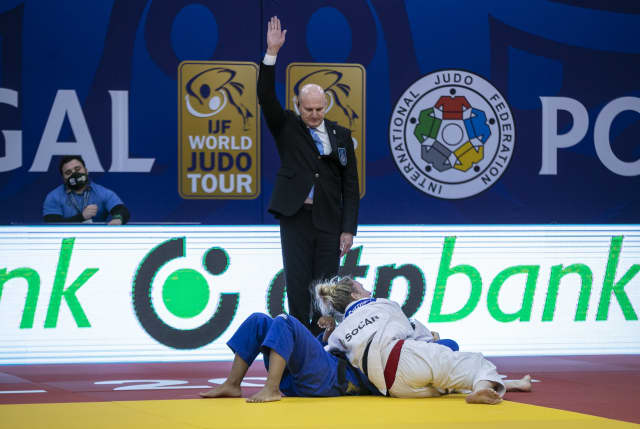What do we talk about at a World Tour event? Of course there’s judo. What is the subject of all the discussions more specifically? Refereeing rule changes, no doubt. Since these new rules, which apply during the current Olympic cycle and until Paris 2024, were announced, they have been on everyone's lips and are the subject of comments and analyses. The problem was that until the Portuguese Grand Prix, no one could say for sure how their set-up would go.
For the moment, the feedback is limited but after a day of competition, a few broad outlines nevertheless emerge which allow us to calmly consider the course of the months to come. There are many players in a judo competition. We gave them the floor, freely, for them to talk honestly about what they felt.
Giuseppe 'Pino' Maddaloni was Olympic champion in 2000 in Sydney. He is now one of the IJF Refereeing Supervisors. "The first observation I can make is that the athletes give the impression of having already understood and integrated the new regulations. They have already adapted. When we train, as they do, three hours a day, in the end, it's not that complicated. As an athlete, it's your job to follow the rules. There's no choice. It's obviously more complicated for other categories of judoka. The public, for example, needs more time to integrate the changes. It's not easy for the referees either. We have to change certain automatic processes, but we have a group of very professional referees and I'm convinced that in two or three competitions, everything will be in place. More specifically, on the first day, I didn't see any complicated situations. Everything went really well."
Miro Bilic is a key figure, since here in Portugal he is the video operator who allows the Refereeing Commission to view actions that require immediate analysis. All day he dissects the matches to propose the best angle so that the right decision is made. "Before the start of the competition, together with the IJF IT team and Florin Daniel Lascau, Head Refereeing Director, we did a titanic job to find all the videos which can allow us to understand what happened in the previous cycle, in order to determine the new orientations concerning refereeing. Once this work was done, here in Portugal, there was no major change to note. We obviously have to be very attentive, maybe even more than usual and that's normal because we all have to adapt, but at the end of the day, I feel like my job has remained the same.
The new points are related to reverse seoi-nage or kumi-kata, but the athletes have already adapted. We did not have many cases. During the first day, no coach came to ask for explanations on decisions they may not have understood, which is a clear statement that everything went smoothly."
Jack Willingham is the IJF TV Director. During events he spend most of his days in the OB van, cutting the live feed and watching judo from all possible angles. "The athletes and the referees have to change their instinct; that’s the main point. I noticed quite a change in the attitude of defence, it’s more open. More risks are taken. Athletes feel more comfortable to attack but otherwise the changes are very subtle. It's really good to have more clarity on the landing on two hands/elbows while defending. We didn't have competitors trying to gain time by readjusting their hair or the judogi. Of course we don't see anymore those 'ride and roll' moves, as we call them in Great Britain and it is easier to follow."
Talking about ride and roll, Gregg Varey (GBR) who was actually competing on day one of the Grand Prix, has another point of view, "It's not that easy for me, because the ride and roll was part of my list of potential scoring techniques. I have to adapt and change my habits. On the other hand I am pleased with the ban of the reverse seoi-nage. I got injured once; my shoulder was dislocated because of that technique, so I can only approve the decision. Ultimately it is business as usual. We have to adapt. If you do proper preparation, the changes shouldn't be a problem."
Kiyoshi Murakami is a fine observer of international judo. the Japanese expert was coach in France for twenty years, before becoming the General Secretary of the All Japan Judo Federation and then the Technical Director of the Italian team. He is now occupying that same position within the Hungarian Judo Federation. If someone knows about judo and traditional judo it is him. "Judo does not change. Referees are more respected. Nobody panics. I didn't see athletes on the mat complaining about decisions, which actually should never be the case, whether you agree or disagree. Judo has etiquette. I truly believe that the new set of rules goes in the right direction. We must keep going on that track to keep the judo spirit strong. It's only the first competition of course and we need time to analyse but honestly on day one I saw good judo and well prepared athletes. It was clear they are here to compete, according to the rules, without trying to play with them. They want to do judo without cheating and I do hope that it's going to continue like that in the spirit of Seiryoku-Zenyo and Jita-Kyoei."
Lucie Décosse (FRA) was an amazing competitor, Olympic and world champion, considered as one of the best technicians in the history of judo, “Really the first day of judo here in Portugal was pretty clear. I like the 90° rule for the impact. It's simple, understandable and there is no discussion about the position of the arm or other things. We can feel, while sitting on the chair, that the referees used to give the decisions more quickly and now they are waiting for the advice from the refereeing table but we can understand that, knowing that we are at the very beginning of a new cycle."
Last but not least are Ioana Babiuc and Raul Camacho, referees present on the World Judo Tour for many years. They are the ones who need to implement the new rules concretely, on the mat. "The most important part is the adaptation. There is no change without adaptation but this is what judo has taught us, to be flexible. We find that the matches are more open for scoring and because of that our position as referees on the tatami must be absolutely perfect. We are leaving more space for the athletes to build their judo. If they are positive, we intervene less. It is a first step here and no it's not always easy but it works and it works well. Next time, in Paris, we'll be even better."
We could have asked so many more people and we will do that in the days and weeks to come, because feedback from the field is probably the most important indicator of the standard of implementation. It's interesting to notice that everyone was able to answer freely and honestly, from their heart.
There is still work to be done, adaptation is an ongoing process. This is exactly what judo is all about. It has many dimensions, some of them being unusual, some of them usual. Eventually, athletes, officials, referees and observers make it what it is and that is what is exciting.






